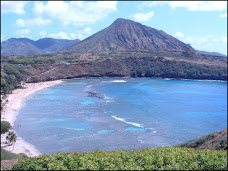Here is an example of the same incident where a person could be charged in both state and federal court.
Hawaii murder suspects face two trials
By Jim Dooley
Advertiser Staff Writer
The first trial of Rodney Joseph Jr., one of three men charged with murder in the January 2004 Pali golf course shooting case, is scheduled to begin Dec. 3 in state court.
Joseph's second trial, involving different charges but based on many of the same facts, is supposed to begin in February in federal court.
Joseph has pleaded not guilty to both sets of charges, although negotiations leading to a possible plea bargain are under way, according to recently filed court documents.
Two other defendants, Ethan "Malu" Motta and Kevin "Pancho" Gonsalves, are also charged in both cases and have also pleaded not guilty. Motta and Gonsalves will be tried separately from Joseph in state court but lost requests to be tried separately in federal court.
Parallel or overlapping criminal prosecutions in state and federal court here are rare, according to criminal defense lawyers and a former federal prosecutor.
Defense attorneys involved in the Pali golf course cases declined to discuss the issue, saying they could not comment on pending cases.
Jim Fulton, executive assistant to City Prosecuting Attorney Peter Carlisle, said his office couldn't comment on the substance of the case, but said, "Rodney Joseph requested to go to trial first in state court. It was his choice."
Jury selection in the state trial is scheduled to begin Dec. 3. The federal case is set for trial Feb. 12.
Assistant U.S. Attorney Thomas Brady, who is prosecuting the federal case, couldn't be reached for comment Wednesday.
Defense lawyer Brook Hart said he could not recall any recent criminal cases that were tried both federally and locally. He remembered a gun possession case in the mid-1970s that was prosecuted in both federal and state courts, "but it certainly doesn't happen very often."
Usually one jurisdiction or the other will agree to handle prosecution duties, Hart said.
"You'd expect there would be some coordination and cooperation between law enforcement agencies to avoid what would seem to be wasteful, time-consuming and unduly expensive duplications of efforts," Hart said.
Joseph, Motta and Gonsalves face terms of life without parole if convicted of the state charges.
At one point, federal authorities considered seeking the death penalty against the men, but the Justice Department notified parties in the case in late June that it would not.
If the federal government had decided to make the trial a death penalty case, Carlisle's office was expected to drop its prosecution. But now both cases are on track for trial.
The Pali shooting was the result of rivalries among groups providing security for illegal casino gambling games in Honolulu, according to law enforcement.
Joseph, Motta and Gonsalves are charged with the shooting deaths of Lepo Utu Taliese and Romelius Corpuz and the attempted murder of Tinoimalu Sao, who was critically wounded with a shot to the head. Sao recovered but still carries the metal slug inside his head, according to court files.
The federal case includes charges of racketeering and using violence in aid of racketeering.
Other defendants in the federal case include Kai Ming Wang, also known as "A Fook," alleged to be the operator of illegal gaming casinos here who hired Joseph and other defendants to provide security at the games.
Wang, a restaurant owner, has pleaded not guilty and denied involvement in the gambling operations.
Raymond Gomes Jr., charged with racketeering and a gun charge by federal authorities, is scheduled to stand trial with Wang, Joseph, Motta and Gonsalves in February.
Several other defendants charged with gambling and other offenses in the federal case have since pleaded guilty in the case. They are Siaosi Alapati, Peter Matautia, Matthew Taufetee and Joe White.
Joseph gave a lengthy statement to police when he turned himself in after the shooting, but that statement was later suppressed in state court after Joseph's lawyers argued that the defendant's original lawyer should not have allowed some admissions to be made.
Federal authorities plan to use some of the the contents of that statement against Joseph and other defendants, although arguments about its admissibility under federal rules are still going on.
Source: http://the.honoluluadvertiser.com/article/2007/Nov/23/ln/hawaii711230364.html
Subscribe to:
Post Comments (Atom)






No comments:
Post a Comment